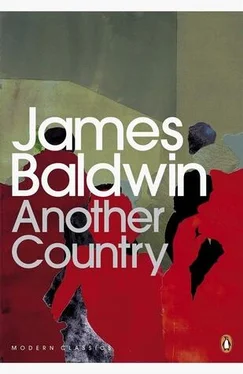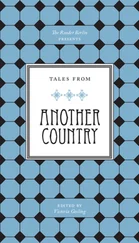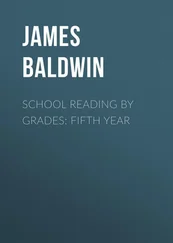Vivaldo turned to Richard. “When can I read your book? I’m jealous. I want to find out if I should be.”
“Well, if you take that tone, you bastard, you can buy it at the bookstore when it comes out.”
“Or borrow it from the library,” Cass suggested.
“No, really, when can I read it? Tonight? Tomorrow? How long is it?”
“It’s over three hundred pages,” Richard said. “Come by tomorrow, you can look at it then.” He said to Cass, “It’s one way of getting him to the house.” Then: “You really don’t come to see us like you used to — is anything the matter? Because we still love you .”
“No, nothing’s the matter,” Vivaldo said. He hesitated. “I had this thing with Jane and then we broke up — and oh, I don’t know. Work wasn’t going well, and”—he looked at Rufus—“all kinds of things. I was drinking too much and running around whoring when I should have been — being serious, like you, and getting my novel finished.”
“How’s it coming — your novel?”
“Oh”—he looked down and sipped his drink—“slow. I’m really not a very good writer.”
“Bullshit,” said Richard, cheerfully.
He almost looked again like the English instructor Vivaldo had idolized, who had been the first person to tell him things he needed to hear, the first person to take Vivaldo seriously.
“I’m very glad,” Vivaldo said, “seriously, very glad that you got the damn thing done and that it worked so well. And I hope you make a fortune.”
Rufus thought of afternoons and evenings on the stand when people had come up to him to bawl their appreciation and to prophesy that he would do great things. They had bugged him then. Yet how he wished now to be back there, to have someone looking at him as Vivaldo now looked at Richard. And he looked at Vivaldo’s face, in which affection and something coldly speculative battled. He was happy for Richard’s triumph but perhaps he wished it were his own; and at the same time he wondered what order of triumph it was. And the way the people had looked at Rufus was not unlike this look. They wondered where it came from, this force that they admired. Dimly, they wondered how he stood it, wondered if perhaps it would not kill him soon.
Vivaldo looked away, down into his drink, and lit a cigarette. Richard suddenly looked very tired.
A tall girl, very pretty, carefully dressed — she looked like an uptown model — came into the room, looked about her, peered sharply at their table. She paused, then started out.
“I wish you were looking for me?” Vivaldo called.
She turned and laughed. “You’re lucky I’m not looking for you!” She had a very attractive laugh and a slight Southern accent. Rufus turned to watch her move daintily up the steps and disappear into the crowded bar.
“Well, you scored, old buddy,” Rufus said, “go get her.”
“No,” said Vivaldo, smiling, “better leave well enough alone.” He stared at the door where the girl had vanished. “She’s pretty, isn’t she?” he said partly to himself, partly to the table. He looked at the door again, shifting slightly in his seat, then threw down the last of his drink.
Rufus wanted to say, Don’t let me stop you, man, but he said nothing. He felt black, filthy, foolish. He wished he were miles away, or dead. He kept thinking of Leona; it came in waves, like the pain of a toothache or a festering wound.
Cass left her seat and came over and sat beside him. She stared at him and he was frightened by the sympathy on her face. He wondered why she should look like that, what her memories or experience could be. She could only look at him this way because she knew things he had never imagined a girl like Cass could know.
“How is Leona?” she asked. “Where is she now?” and did not take her eyes from his face.
He did not want to answer. He did not want to talk about Leona — and yet there was nothing else that he could possibly talk about. For a moment he almost hated Cass; and then he said:
“She’s in a home — down South somewhere. They come and took her out of Bellevue. I don’t even know where she is.
She said nothing. She offered him a cigarette, lit it, and lit one for herself.
“I saw her brother once. I had to see him, I made him see me. He spit in my face, he said he would have killed me had we been down home.”
He wiped his face now with the handkerchief Vivaldo had lent him.
“But I felt like I was already dead. They wouldn’t let me see her. I wasn’t a relative, I didn’t have no right to see her.”
There was silence. He remembered the walls of the hospital: white; and the uniforms and the faces of the doctors and nurses, white on white. And the face of Leona’s brother, white, with the blood beneath it rushing thickly, bitterly, to the skin’s surface, summoned by his mortal enemy. Had they been down home, his blood and the blood of his enemy would have rushed out to mingle together over the uncaring earth, under the uncaring sky.
“At least,” Cass said, finally, “you didn’t have any children. Thank God for that.”
“She did,” he said, “down South. They took the kid away from her.” He added, “That’s why she come North.” And he thought of the night they had met.
“She was a nice girl,” Cass said. “I liked her.”
He said nothing. He heard Vivaldo say, “—but I never know what to do when I’m not working.”
“You know what to do, all right. You just don’t have anybody to do it with.”
He listened to their laughter, which seemed to shake him as though it were a drill.
“Just the same,” said Richard, in a preoccupied tone, “nobody can work all the time.”
Out of the corner of his eye, Rufus watched him stabbing the table with his stir-stick.
“I hope,” Cass said, “that you won’t sit around blaming yourself too much. Or too long. That won’t undo anything.” She put her hand on his. He stared at her. She smiled. “When you’re older you’ll see, I think, that we all commit our crimes. The thing is not to lie about them — to try to understand what you have done, why you have done it.” She leaned closer to him, her brown eyes popping and her blonde hair, in the heat, in the gloom, forming a damp fringe about her brow. “That way, you can begin to forgive yourself. That’s very important. If you don’t forgive yourself you’ll never be able to forgive anybody else and you’ll go on committing the same crimes forever.”
“I know,” Rufus muttered, not looking at her, bent over the table with his fists clenched together. From far away, from the juke box, he heard a melody he had often played. He thought of Leona. Her face would not leave him. “I know,” he repeated, though in fact he did not know. He did not know why this woman was talking to him as she was, what she was trying to tell him.
“What,” she asked him, carefully, “are you going to do now?”
“I’m going to try to pull myself together,” he said, “and get back to work.”
But he found it unimaginable that he would ever work again, that he would ever play drums again.
“Have you seen your family? I think Vivaldo’s seen your sister a couple of times. She’s very worried about you.”
“I’m going up there,” he said. “I haven’t wanted to go — looking this way.”
“They don’t care how you look,” she said, shortly. “ I don’t care how you look. I’m just glad to see you’re all right — and I’m not even related to you.”
He thought, with a great deal of wonder, That’s true, and turned to stare at her again, smiling a little and very close to tears.
“I’ve always thought of you,” she said, “as a very nice person.” She gave his arm a little tap and pushed a crumpled bill into his hand. “It might help if you thought of yourself that way.”
Читать дальше












